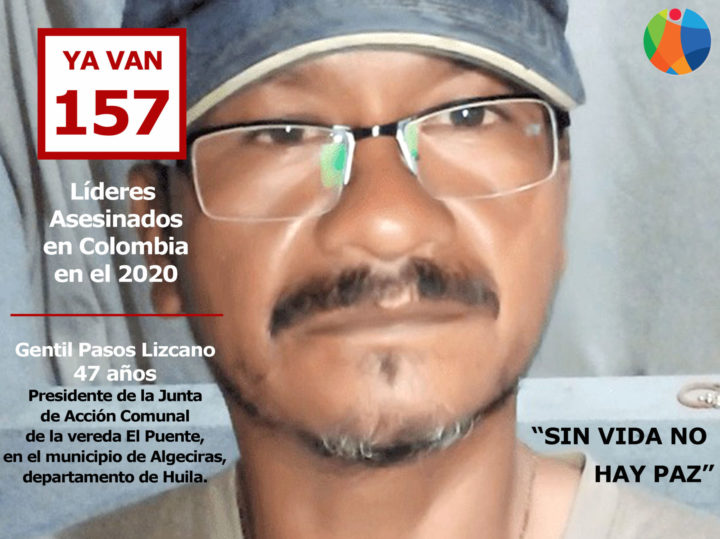As of the writing of this article (7/09), Colombia has reached 161 assassinations of community leaders in 2020, the latest being Gentil Pasos’s. Presently, the average is of three to four murders per week . Just on June 27th, the Institute of Studies for Peace and Development, IDEPAZ, registered 7 assassinations.
Gentil Pasos Lizcano, 47, was the President of the Assembly for Communal Action of the El Puente Village in the Algeciras municipality, northeast of the Huila Department. It was there, in a pool hall allegedly owned by him, where he was murdered by strangers last 5th of July.
Algeciras is under two hours from Neiva, the capital, which has around 24 000 inhabitants and is the agricultural storage center for Huila. This region’s farmers make a living mainly out of coffee harvest.
According to Indepaz’s data for the current year, Gentil is the country’s 157th assassinated leader, and the seventh victim in this department, counting as well the murder of two former FARC fighters. As if it weren’t enough, it’s the third murder committed in the Algeciras municipality over just last week. Its inhabitants are living a time of uncertainty and fear.
Lorena Sánchez, representative for the Association of Farm Workers from Huila, declared that Gentil was “a man that stood out for his agrarian leadership and for his defense of farmers’ rights in Algeciras”.
Last May, in response to the assassination of the president of the neighborhood council of San Juanito, Saúl Rojas González, 69, legal representative Basilio Arias declared to the El Tiempo newspaper (May 26th 2020) that while this year has seen multiple assassinations of ex-fighters and other well known community leaders, “the impunity has been total, because the investigations have not led to any arrest”.
See: A call for vigilance in Algeciras, Huila, after crimes against social leaders (in Spanish) As a result of this new case, Lorena Sánchez added that “we continue to alert the authorities about the vulnerability of the regions’ leaders. This is not new, it’s systematic and clearly showcases the State’s inability to give leaders any guarantee”.
A July 7th editorial of the Huila branch of the “La Nación” newspaper asks “Who is responsible in Algeciras?”, referring to this latest wave of violence. It says in one of its sections:
“Although the police and the army try to justify this increase of violent deaths to “simple fighting between ex guerrillas”, what we observe here is the inability of the State’s security organs to protect the people of Algeciras, starting with the fact that from the ten murders that took place here this year, there was neither a timely nor an effective response by authorities to capture those responsibles for these crimes red-handed. Many of these murders took place in urban zones, where security is allegedly enforced by the Huila police. The three murders committed between Wednesday 1st and Sunday 5th of July were registered in rural zones, allegedly under the responsibility of the army’s 9th brigade.”
See: Who commands in Algeciras? (In Spanish)
Although the editor acknowledges the five arrests made by authorities neither direct nor concrete proof against the detainees and the crimes they may have partaken in is known as of today”.
The violence in Algeciras continues to increase and the protection of its leaders’ provokes uneasiness to the point that the population has seen itself forced to migrate.






